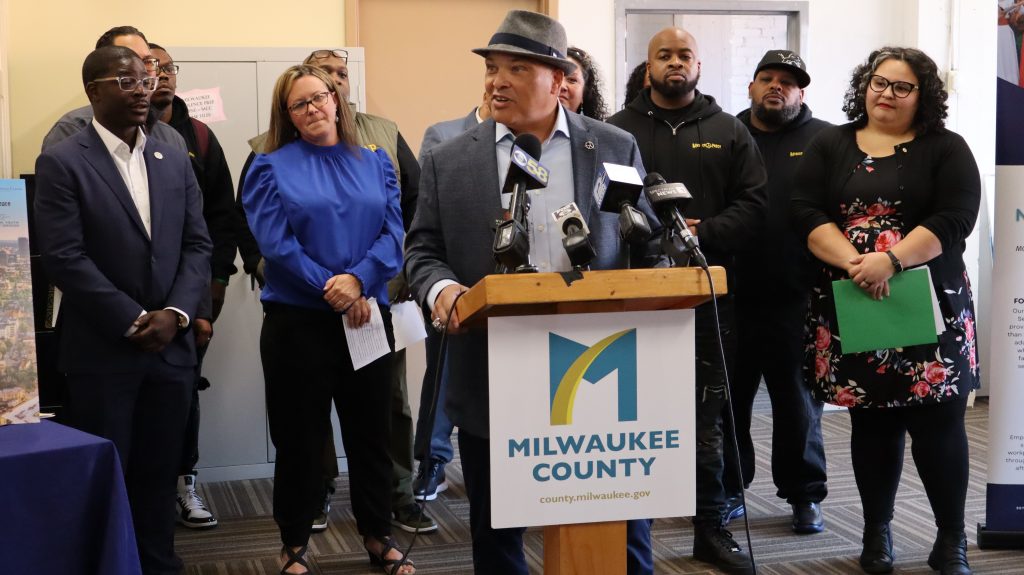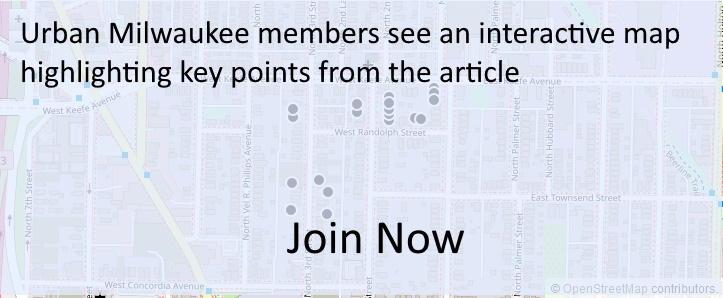New Gun Violence Prevention Program Goes After Habitual Offenders
Based on national gun violence prevention model, program will target up to 40 frequent shooters.

DeVone Boggan (Center). Photo taken Oct. 29, 2024 by Graham Kilmer.
Milwaukee County is taking a new gun violence prevention initiative to the proverbial source: the people who are carrying firearms and committing shootings.
The county announced Tuesday it is implementing a gun violence prevention program, created by California-based nonprofit Advance Peace, that aims to disrupt the cycle of retaliatory gun violence by reaching out directly to the people in Milwaukee who are committing the shootings.
The program calls for the use of persistent daily contact to offer firearm offenders access to mentorship, mental health resources, skills training, job placement and even a monthly stipend for not engaging in gun violence.
The program is a non-law enforcement intervention in violent crime, County Executive David Crowley said Tuesday, aimed at people already caught in the cycle of violence, “figuring out ways to really get them on a better path, give them the resources, give them the skill sets that they need in order to live much better lives.”
The county is partnering with the Milwaukee Christian Center to run the program. The center has worked with the county in the past on its credible messengers program, which had a similar goal of preventing violence and and youth incarceration by connecting young people with mentorship and social and human resources.
“Community violence, as we know, is often the result of significant trauma for individuals and the community, and it continues that cycle,” said David Muhammad, deputy director for the Department of Health and Human Services (DHHS) during a press conference held at the Christian Center’s headquarters, 807 S. 14th St.
The county received a $2 million grant from the U.S. Department of Justice to run the program over a three-year period. The county plans to engage up to 40 young people in the program, particularly targeting young men between the ages of 18 and 24, said Kelly Pethke, administrator of the county’s division of Children, Youth and Family Services
The Advance Peace program has been found to reduce gun violence in cities where it is implemented, according to a study published by the University of California, which also partners with Advance Peace to collect and evaluate program data. Crowley said he hopes that county will be able to report similar success in the future.
The model uses communtiy outreach to get in touch with persons, usually young men, who are “committed to using a firearm to solve the street conflicts that they find themselves navigating day in and day out,” said DeVone Boggan, creator of the Advance Peace model. Once in contact, the county will attempt to persuade the young men to become a program fellow.
The 18-month program then uses persistent contact with the young men who become fellows, reaching out multiple times daily. It works with them to try to create a plan for their future . Many of these young men involved in gun violence and retaliatory shootings do not expect to live very long, Boggan said. One metric the Advance Peace model uses to measure the program’s success is whether the young men are still alive at the end of their involvement.
The program also offers a stipend for successfully participating in the program and not committing violent acts. Boggan noted this aspect of the program has been characterized as “paying criminals not to shoot,” but he disagrees with this framing.
“No one is paying anyone not to shoot,” he said. “They’re able to understand their value and worth by working every single day, demonstrating every single day their commitment to working to change their lives; everybody else is getting paid in the ecosystem, supported in the ecosystem.”
The program also places fellows in jobs and internships that match their interests and subsidizes their placement there for up to a year.
Fellows will also be given the opportunity to travel outside of Wisconsin, and potentially the country, but they will be forced to do so with someone who they had previously tried to shoot, or had tried to shoot them. The experience is supposed to break down the rivalries that drive retaliatory gun violence, Boggen said.
The program does not work with law enforcement. It is critical to the program’s success that they build trust with individuals who are already likely a target of law enforcement, Boggen said.
The concept is predicated on the idea that much of the retaliatory gun violence in a given city is driven by a small group of “habitual shooters” who manage to evade law enforcement. “We’ve got to make sure that our resources are engaging the very individuals driving the gun violence,” Boggen said.
The City of Milwaukee also operates an Office of Community Wellness and Safety, formerly the Office of Violence Prevention, and the Medical College of Wisconsin operates the 414Life violence interrupter program.

Existing members must be signed in to see the interactive map. Sign in.
If you think stories like this are important, become a member of Urban Milwaukee and help support real, independent journalism. Plus you get some cool added benefits.
Political Contributions Tracker
Displaying political contributions between people mentioned in this story. Learn more.
MKE County
-
Fellow Judge Testifies in Dugan Case
 Dec 16th, 2025 by Graham Kilmer
Dec 16th, 2025 by Graham Kilmer
-
Key Questions in Dugan Trial Take Shape on First Day
 Dec 15th, 2025 by Graham Kilmer
Dec 15th, 2025 by Graham Kilmer
-
FTA Tells Milwaukee to Crack Down on Fare Evasion — Even Where Fares Don’t Exist
 Dec 12th, 2025 by Graham Kilmer
Dec 12th, 2025 by Graham Kilmer






















Seems like a good idea, but why are the habitual shooters not in jail in the first place?